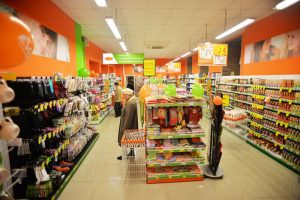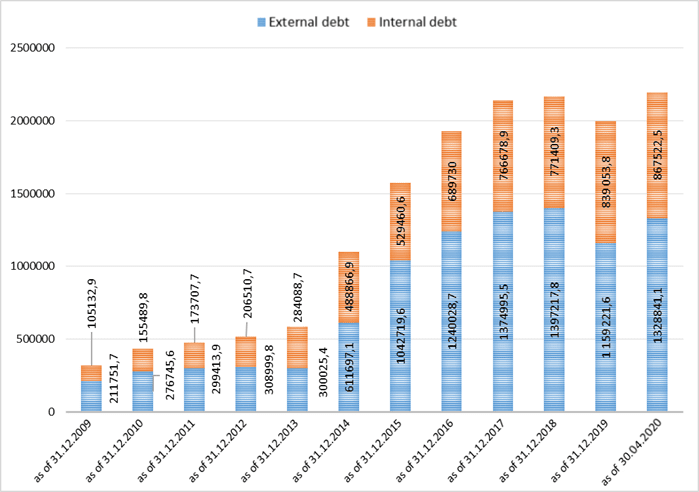
RUSH LLC (Dnipro), which manages a network of about 1,000 Eva perfumery and cosmetic stores in Ukraine, has decided to increase investments in the reconstruction of the online store’s warehouse on the site in Brovary by reducing the store opening plan in the third quarter of 2020 to 25 outlets.
“By reducing the plan for opening stores in the third quarter, we were able to increase investments in the reconstruction of the online store’s warehouse at our site in Brovary. This year, the plans were to equip and automate the online store’s warehouse, which should handle 10,000 orders per day. Due to the rapid growth of online orders, we decided to increase investments and invest an additional UAH 27 million. We planned to carry out the next stage of expansion of this facility next year, but decided to do it this year,” Executive Director of RUSH LLC Olha Shevchenko said in a blitz interview with Interfax-Ukraine.
According to her, an increase in funding for this project will improve effectiveness from 10,000 to 20,000 orders per day.
“Whether we can reach such a level of orders in the online store in 2020 is still unknown. I think most likely not. But this will allow us to prepare for future growth,” Shevchenko said.
In the first quarter of 2020, the Eva chain opened 29 new stores, in the second quarter – 25 stores.

President of Ukraine Volodymyr Zelensky has said that the Deputy Prime Minister for Industrial Policy could appear in the government of Ukraine in a week.
“We decided to reinstate such a position as Deputy Prime Minister for Industrial Policy … We have already seen many really professional people. Now we are choosing the best candidate. Because for us both the country’s industry, the defense industry, the space industry, and all our enterprises, as one of the best candidates for this position said, is the country’s development strategy. For the country to really be industrial, to be a space country,” he said at a meeting with business representatives of Odesa region on Saturday.
Zelensky pointed out that in Ukraine there is a full cycle at many enterprises in order to build an industrially powerful country.

Foreign Minister of Ukraine Dmytro Kuleba has met with the owners and leaders of Ukrainian businesses, which operate in Turkey, the press service of the Foreign Ministry has said.
“The owners and leaders of Ukrainian businesses positively assessed the initiative of the Ukrainian Embassy in Turkey to create the Ukrainian Business Association in Turkey, a union aimed at promoting Ukrainian companies in the Turkish market,” the statement said.
All participants in the meeting agreed on the need to further expand the economic presence of Ukraine in Turkey.
The Foreign Minister of Ukraine, in turn, noted that IT services and agriculture are two export spheres that adequately represent the brand of Ukraine in the world.
“In particular, in the context of the pandemic’s disrupting traditional supply chains, the powerful agricultural export turns Ukraine into a guarantor of the world’s food security,” the press release said.
Kuleba drew special attention of those present to the recently updated Council of Exporters and Investors under the Foreign Ministry of Ukraine. This body is able in practice to promote domestic business in consolidation, in particular, in the Turkish market. In addition, it is able to open up additional prospects for common access with Turkish partners to the markets of third countries.
“My task is to build a system of the Foreign Ministry that clearly works and helps businesses and investors. I urge you to actively use the opportunities offered by the format of the Council of Exporters and Investors under the Foreign Ministry,” Kuleba said.
Internal and external debt of Ukraine in 2009-2020

Ukraine became the largest supplier of grain to the Kingdom of Thailand and exported products worth more than $140 million in 2019, the press service of the Ukrainian Embassy in Thailand said.
The embassy said on its Facebook page that Ambassador of Ukraine to Thailand Andrii Beshta met with Director General of the Department of Trade Negotiations of the Ministry of Commerce of the Kingdom of Thailand Auramon Supthaweethum, during which the cooperation between the countries on trade and investment was discussed.
“Therefore, during the meeting, the parties discussed the implementation of the Trade Agreement signed in 2017 between the governments of Ukraine and Thailand, in particular, the importance of holding an inaugural meeting of the Joint Trade Commission and the Ukraine-Thailand Business Forum by the end of 2020,” the embassy said in the statement.
It is noted that Ukraine became the largest supplier of grain to Thailand and exported this type of product in the amount of more than $140 million over 2019. The total trade in goods and services between Ukraine and Thailand amounted to $570 million with a surplus of more than $116 million for Ukraine in 2019.

Ukraine plans to open its embassy in Albania this year, Deputy Foreign Minister of Ukraine Vasyl Bodnar said during a meeting with newly appointed Charge d’Affaires of the Republic of Albania in Ukraine Fation Peni.
According to the press service of the Ministry of Foreign Affairs of Ukraine (MFA), Bodnar informed the Albanian side about Ukraine’s plans to open its embassy in Albania in 2020 “which will mark the beginning of qualitatively new stage in the history of Ukraine-Albania relations.”
Peni passed the Ukrainian side Albania’s note on the opening of the country’s diplomatic mission in Ukraine.
The parties shared opinions about the preparations for the conclusion of an underlying agreement on friendship and cooperation between Ukraine and Albania, which will become the main document determining the framework of bilateral relations.
Bodnar and Peni also praised the resumption of air traffic between Ukraine and Albania from June 26, 2020 and the selection of Ukraine International Airlines for carrying out regular flights between the capitals of the two countries.
They also discussed intensification of the countries’ high-level political dialogue.